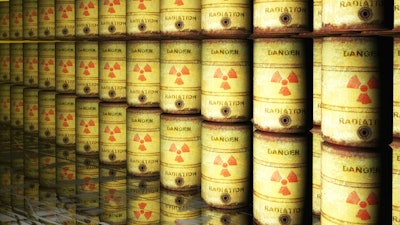
SANTA FE, N.M. (AP) — A new proposal to store nuclear waste underground in southern New Mexico — this time from nuclear reactors across the country — has cleared an initial regulatory hurdle and can now be vetted for detailed safety, security and environmental concerns, the Nuclear Regulatory Commission announced Thursday.
Federal nuclear regulators said the proposal from Holtec International to temporarily store spent nuclear fuel in southeastern New Mexico is sufficiently complete to begin the technical review process that eventually involves expert testimony and public comment.
Holtec is seeking an initial 40-year license for an underground storage facility that could accept radioactive used fuel piling up at reactors across the United States.
Southern New Mexico already is the site of the nation's only underground nuclear waste repository that handles radioactive material from decades of bomb-making nuclear research. A 2014 radiation release at the Waste Isolation Pilot Project caused by an inappropriately packed container of waste forced the closer of that facility for three years, with extended repairs estimated to cost more than half a billion dollars.
For the proposed spent nuclear fuel storage facility, safety advocates have warned of transportation risks associated with moving massive casks of used fuel thousands of miles to New Mexico, and urged the public to speak up about the proposal.
"Up to now, it's been Holtec talking to the Nuclear Regulatory Commission for the last 11 months," said Don Hancock, nuclear programs director for the Southwest Research and Information Center, an Albuquerque-based environmental protection group. "Now the public is going to be able to get involved."
Many local residents and politicians including New Mexico Gov. Susana Martinez have voiced support for Holtec's plans.
In a written notice to Holtec, federal nuclear regulators outlined a series of reviews that could be completed by July 2020 — or be delayed and suspended, based on responses from the company and safety determinations.
Federal officials have long acknowledged that the future of nuclear energy in the U.S. depends on the ability to manage used fuel and high-level radioactive waste.
Since President Donald Trump took office, some members of Congress have shown renewed interested in the mothballed Yucca Mountain project in Nevada as a long-term solution. But the industry has shown support for temporary storage as part of the storage equation because of the amount of time it would take to license a facility at Yucca Mountain.






















